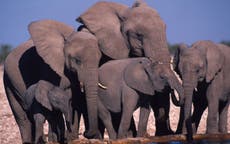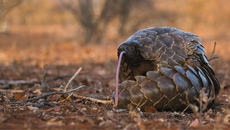‘Extinction Denialism': How to fight a growing anti-science movement
A new study explores ways in which denialists seek to undermine evidence on biodiversity loss – and how science might fight back
Your support helps us to tell the story
From reproductive rights to climate change to Big Tech, The Independent is on the ground when the story is developing. Whether it's investigating the financials of Elon Musk's pro-Trump PAC or producing our latest documentary, 'The A Word', which shines a light on the American women fighting for reproductive rights, we know how important it is to parse out the facts from the messaging.
At such a critical moment in US history, we need reporters on the ground. Your donation allows us to keep sending journalists to speak to both sides of the story.
The Independent is trusted by Americans across the entire political spectrum. And unlike many other quality news outlets, we choose not to lock Americans out of our reporting and analysis with paywalls. We believe quality journalism should be available to everyone, paid for by those who can afford it.
Your support makes all the difference.Scientists sounding the alarm on the perilous state of biodiversity are being met with such increasing amounts of misinformation that a new term has been coined: extinction denialism.
WWF’s recent Living Planet Report 2020 described global wildlife populations as “in freefall”, noting that populations of mammals, birds, fish, amphibians and reptiles have collapsed by an extraordinary 68 per cent on average globally since 1970.
Scientists call it the “sixth mass extinction” and say it is caused by human activity – whether that be deforestation, habitat degradation, the illegal wildlife trade or the climate crisis.
In a report, published on Friday in the journal Nature, researchers from a number of institutions around the world examined how denialists seek to undermine evidence on biodiversity loss – and how science might fight back.
Conspiracy theories and misinformation campaigns are nothing new as climate change denial and the anti-vaxxer movement continue to proliferate, with social media acting as a driving force.
And while debate is part of science, the researchers found that studies about biodiversity loss have been met with an avalanche of op-eds that not only criticise the findings but attack “the reputations of the report’s authors and the process of estimating the total number of species threatened with extinction”.
The attacks often don’t include evidence and do not come in good faith.
Alexander Lees, senior lecturer in conservation biology at Manchester Metropolitan University who co-authored the study, told Mongabay: “Many of the same individuals that routinely seek to downplay the impacts of climate change have written articles understating the biodiversity loss crisis.
“Denialists have sought to obfuscate the magnitude of both extinctions and loss of bio-abundance.”
The international research team found that “extinction denialism” can be divided into three categories:
- “Literal denial”: For example, that species extinctions were predominantly a historical problem;
- “Interpretive denial": Such as the argument that economic growth alone will fix the extinction crisis;
- “Implicatory denial": How technological fixes and targeted conservation interventions will overcome extinction, for example.
According to the study, underestimating and overlooking recent extinctions is a common trait, in particular using the example of the Atlantic Rainforest “long touted by deniers as an example of a biome that had lost 90 per cent of its habitat without a single documented extinction”.
Yet, two species of bird were confirmed as extinct last year, and seven other species have not been seen for a decade or are down to their final numbers.
The researchers note that those who downplayed the relatively small number of documented extinctions are much like those who claimed the Covid-19 pandemic was overblown.
“Just as the true number of cases was underestimated because of the widespread lack of testing, the true number of extinctions is far higher than those observed, because the majority of the Earth’s species have not even been described — especially the rarer and more specialised species, which are most vulnerable,” researchers said.
In the face of a wave of misinformation, how then, should scientists try to combat it?
First, the researchers say, “conduct rigorous science” and strive to have the best understanding of the extinction crisis.
But this alone is not enough: communicate it to a wide audience, working with journalists and artists, for example, ”before denialists are able to contrive a consensus gap".
The researchers also point to arguments of how the scientific consensus on climate change was undermined by “seepage”, where scientists overemphasised uncertainty and allowed deniers to fill the vacuum.
Confronting skilled sensationalists and contrarians is a “major challenge” the report writes, when they are "arguing positions rather than establishing the truth".
The researchers advise remaining “cordial” but note: “There is little point in being respectful of insincere arguments.”




Join our commenting forum
Join thought-provoking conversations, follow other Independent readers and see their replies
Comments